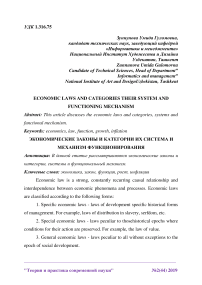Economic laws and categories their system and functioning mechanism
Автор: Zunnunova U.G.
Журнал: Теория и практика современной науки @modern-j
Рубрика: Основной раздел
Статья в выпуске: 2 (44), 2019 года.
Бесплатный доступ
This article discusses the economic laws and categories, systems and functional mechanism.
Economics, law, function, growth, inflation
Короткий адрес: https://sciup.org/140274331
IDR: 140274331
Текст научной статьи Economic laws and categories their system and functioning mechanism
Economic law is a strong, constantly recurring causal relationship and interdependence between economic phenomena and processes. Economic laws are classified according to the following forms:
-
1. Specific economic laws - laws of development specific historical forms of management. For example, laws of distribution in slavery, serfdom, etc.
-
2. Special economic laws - laws peculiar to thosehistorical epochs where
-
3. General economic laws - laws peculiar to all without exceptions to the epoch of social development.
conditions for their action are preserved. For example, the law of value.
For example, the law of increasing needs. Features of economic laws:-obligatory- the inevitability of their actions, if there are appropriate conditions-sustainability- constancy, manifested in their repetition. Economic laws do not act automatically, not by themselves.
They express the essence, determine the general direction of economic activities. Economic laws are manifested through subjective the activities of people whose actions are due to objective circumstances. The use of economic laws is that people must relate their actions to their requirements in practice management. Economic categories are logical concepts, reflecting the most common and significant aspects of economic phenomena and processes. Methods of scientific knowledge of economic processes.
Economic reality consists of a huge amount facts, cognizing which economic theory uses various methods(from the Greek. - A way of research) scientific knowledge:- dialectical method - all phenomena and processes of economic life considered in relationship and continuous development;- method of scientific abstraction - consists in cleansing the object of study from random, temporary features and identification of permanent, characteristic properties;-method of analysis and synthesis - in the process of analysis the object of study it is divided into its component parts and parties and their separate research, synthesis - connection of separate parts into a whole, helps see the interaction of selected elements in the analysis;- induction method - based on the analysis of the actual material are derived economic laws and theories;- the deduction method is the reverse process when the hypothesis is advanced checked by studying the facts of economic reality;- statistical observation - data collection according to certain criteria with a certain frequency (frequency);- economic modeling - possible in verbal, graphic or mathematical form, gives the opportunity to predict the development of the studied processes and evaluate the possible result based on known conditions and logic of behavior of elements of the economic system;- setting economic experiments is quite complicated process because economic phenomena do not exist in isolation, but manifest themselves in a variety of socio-economic phenomena and related to people's interests.
General scientific methods of knowledge used in economic theories are: -historical - phenomena and events are considered inherent their sequence of historical development; - logical - correct application of generally significant forms of thought (concept, judgment, inference and etc.)
Using the unity of historical and logical research methods, economic theory considers economic processes in historical sequence of their occurrence and logical relationship. With a point view of the level of study of economic processes economic theory divided into macroeconomics (behavior of individual economic subjects)and microeconomics (the behavior or functioning of a national economic system as a whole). In its composition can also be identifiedmeso economics (behavior of individual subsystems of the national economy or branches of national economy) and super macroeconomics omega economics.
Source used:
-
1. Statistical Yearbook of the Regions of Uzbekistan. 2015. –T
.:Goskomstat of Uzbekistan. 2015. - 130 pages.
-
2. Statistical Review of Uzbekistan. 2010-2015.
-
3. Uzbekistan in numbers. 2014. - T.:, Goskomstat of Uzbekistan4. 2015. -188 pages.
Список литературы Economic laws and categories their system and functioning mechanism
- Statistical Yearbook of the Regions of Uzbekistan. 2015. -T.:Goskomstat of Uzbekistan. 2015. - 130 pages.
- Statistical Review of Uzbekistan. 2010-2015.
- Uzbekistan in numbers. 2014. - T.:, Goskomstat of Uzbekistan4. 2015. - 188 pages.


